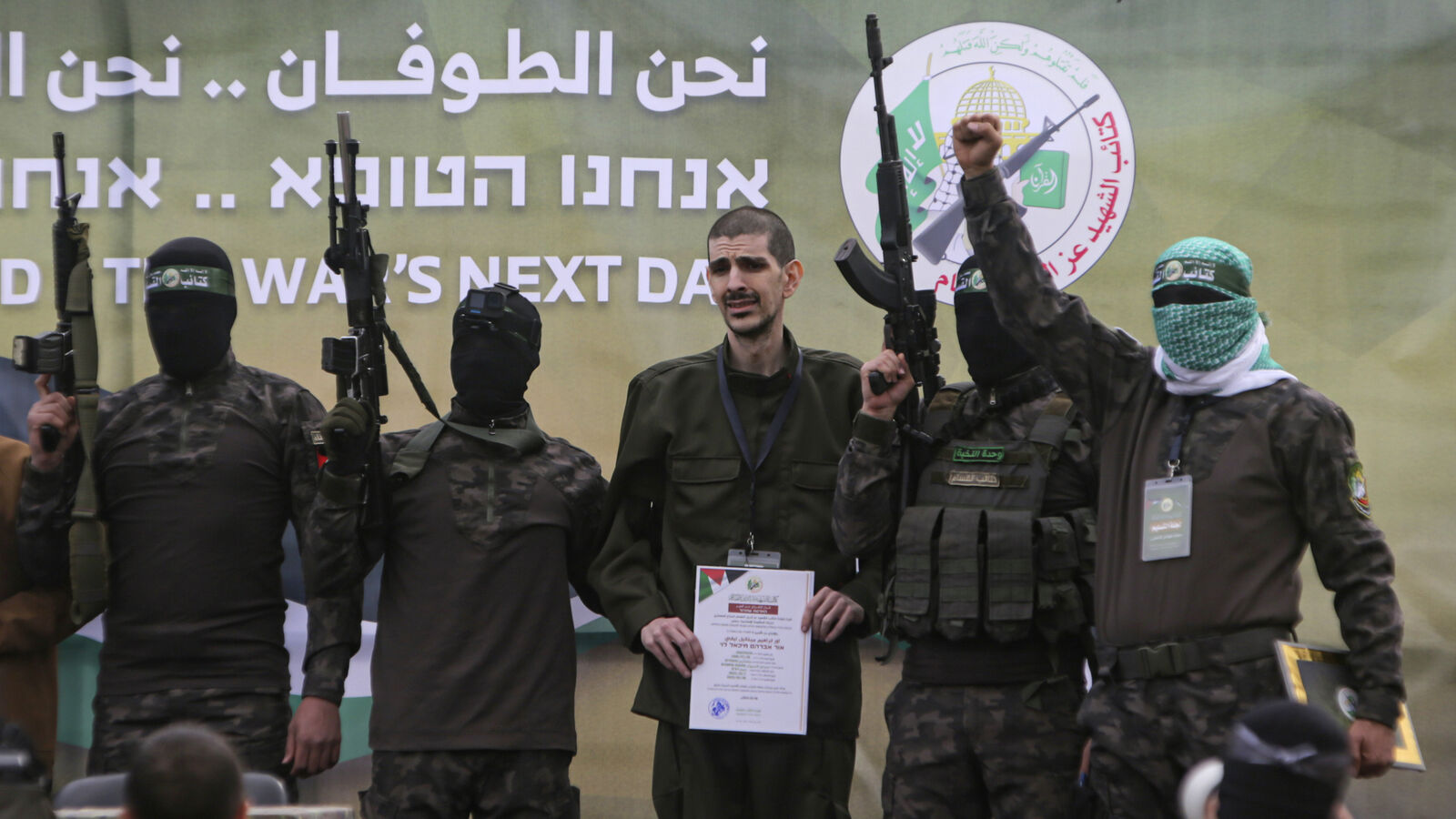
Israeli captive Or Levy, center, who has been held hostage by Hamas in Gaza since Oct. 7, 2023, is escorted by Hamas fighters before being handed over to the Red Cross in Deir al-Balah, central Gaza Strip, Saturday Feb. 8, 2025. (AP Photo/Jehad Alshrafi)
Gregory Lyakhov: Western Silence on hostages results in support of Hamas
Western Silence Cost the Hostages Their Lives
When Hamas terrorists stormed into Israel on October 7th, they didn’t just murder civilians—they took hostages. Among them were Shiri Bibas and her two young sons, Ariel and Kfir. The world knew their names. The world knew their suffering. And yet, when it had the chance to act, it did nothing.
For months, these hostages remained in captivity, their fate uncertain. Governments, human rights organizations, and world leaders had a choice: demand their immediate release or stay quiet. Most chose the latter. The same nations that claim to support justice and human rights failed to apply those principles when it mattered most.
By the time Hamas returned the bodies of Shiri, Ariel, and Kfir, it was too late. The United Nations called their treatment “abhorrent,” but outrage after the fact is meaningless. The time to speak up was when they were still alive.
The message sent to terrorists everywhere is clear: hostage-taking works, and there will be no real consequences.
The Retreat Of The West
This failure was not just about one family. It was part of a larger pattern.
For decades, countries like Canada, France, and Australia stood with Israel, claiming to share its values and commitment to fighting terrorism. But when Hamas committed one of the worst massacres in Israel’s history, these same nations hesitated.
Instead of supporting Israel’s right to defend itself, they lectured it about restraint. Instead of eradicating Hamas, they backed ceasefire resolutions that didn’t even mention the terror group.
After October 7th, Canadian Prime Minister, Justin Trudeau, condemned the attack, as any leader should. But within days, his tone shifted. Instead of standing firmly with Israel, he warned about “proportionality” and urged “both sides” to show restraint—as if the massacre of civilians and the military response to stop further attacks were morally equal.
Then, in what may have been the biggest betrayal, Canada backed a United Nations ceasefire resolution that failed to mention Hamas at all. It signaled to the world that terrorism would not be punished, only negotiated with.
The impact was immediate. Antisemitic incidents in Canada skyrocketed by 670%, targeting Jewish schools, businesses, and synagogues. Yet Trudeau’s government remained largely silent. Meanwhile, institutions like the International Criminal Court (ICC) followed Canada’s lead, launching investigations into Israel while ignoring far worse crimes committed by Iran, Russia, and North Korea.
France was once one of Israel’s strongest allies, providing it with weapons and military support in the 1950s and 60s. But that relationship has changed.
After October 7th, French President, Emmanuel Macron, expressed sympathy for Israeli victims. But sympathy without action is meaningless. Soon after, he called for “proportionality” and then, in a stunning move, proposed a global arms embargo—not against Hamas, not against Iran, but against Israel.
Macron’s move was not a mistake; it was a political calculation. A 2024 poll found that 60% of French citizens now support Palestinian causes. Antisemitic incidents have been rising in France, and instead of standing firm, the government has chosen to appease public opinion.
The result? Israel no longer sees France as a reliable ally. A decade ago, nearly 60% of Israelis viewed France as a trusted partner. Now, that number has fallen to 15%. Trade is slowing, and security ties are fading. France made its choice—popularity over principles.
Unlike Canada and France, Australia did not loudly criticize Israel. It simply backed away. In 2022, Australia withdrew its recognition of West Jerusalem as Israel’s capital. It was a small but deliberate move, signaling that Australia no longer saw Israel’s sovereignty as something to stand behind.
Then, after October 7th, Australia followed the same pattern as its Western counterparts. First, it condemned Hamas’s attack. Then, it shifted its focus to Israel’s military response.
Finally, in February 2024, it abstained from a UN vote condemning Israel’s actions—choosing neutrality in a fight where one side kidnaps babies and the other fights to bring them home.
Public opinion is shifting too. A 2024 Lowy Institute poll found that while 52% of Australians still see Israel as an ally, 38% now believe its actions are unjustified. Jewish Australians, once confident in their country’s support, now feel abandoned.
The Consequences of Weakness
When the time came to act, Western nations hesitated, choosing politics over principle.
The hostages, whose suffering was seen around the world, became proof of that betrayal. Their fate sent a clear message: taking innocent lives works, and the world will allow it. When the bodies of Shiri, Ariel, and Kfir were returned, it was a tragic reminder that silence and inaction have deadly consequences.
This is not just about one tragedy—it is a warning. Abandoning allies in the face of terror only encourages more violence. The cost is not just in lives lost, but in the collapse of the values the West claims to stand for. If world leaders do not learn from October 7th, if they keep choosing comfort over courage, this will happen again. And next time, it may be even closer to home.
Gregory Lyakhov, a high school student from Great Neck, NY, is a passionate advocate for Israel and U.S. politics. His work has been featured in The New York Post, The Jerusalem Post, and The Times of Israel, with public appearances on Fox & Friends and Newsmax and now israelseen.com








